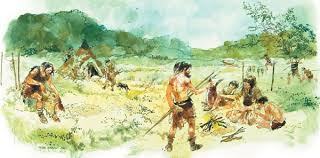From Asad Zaman
Topics:
Asad Zaman considers the following as important: Uncategorized
This could be interesting, too:
tom writes The Ukraine war and Europe’s deepening march of folly
Stavros Mavroudeas writes CfP of Marxist Macroeconomic Modelling workgroup – 18th WAPE Forum, Istanbul August 6-8, 2025
Lars Pålsson Syll writes The pretence-of-knowledge syndrome
Dean Baker writes Crypto and Donald Trump’s strategic baseball card reserve
from Asad Zaman

As a preliminary demonstration, and an explanation of the “Three Methodologies“, we assess how they work in primitive hunter-gatherer societies.
A hunter-gatherer is a human living in a society in which most or all food is obtained by foraging (collecting wild plants and pursuing wild animals), in contrast to agricultural societies, which rely mainly on domesticated species.
There are many characteristics of such societies forced by the material conditions of production. Since existing food supplies in any one location are soon exhausted, such societies are generally nomadic. Here are some philosophies, and political and social structures that would naturally arise in hunter-gatherer nomadic societies.
Philosophy: Since human beings are directly dependent on the environment, the idea of “Mother Earth” and a close relationship with nature can be expected to develop. This stands in contrast with urban lifestyles which are remote from nature; it is this detachment from nature which has permitted the widespread environmental destruction which is currently taking place.
Politics: Typical Hunter-Gatherer societies are egalitarian. This is because everyone derives a living directly from nature, and is mobile. If one subgroup is oppressed, they can simply leave, so there is not much room for powerful groups to exercise large amounts of power and control over other groups. Furthermore, in subsistence economies, one cannot afford slaves because there is generally not enough surplus food to feed them. So economic conditions favor egalitarian political structures; nonetheless, human ingenuity can sometimes overcome such obstacles.
Property: Since property of nomads is confined to what they can carry with them, it is necessarily limited. Illustrative of hunter-gatherer attitudes towards property is the Cherokee Constitution of 1839, which states: “The lands of the Cherokee Nation shall remain common property”.
We now consider insights yielded into the study of such societies by the three methodologies discussed in the previous post. read more
